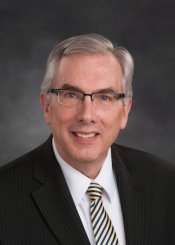WASHINGTON, D.C. — J. Scott Angle, director of USDA’s National Institute of Food and Agriculture, announced today that Barry Dunn, president of South Dakota State University, was selected to deliver the 2019 William H. Hatch Memorial Lecture Sunday in San Diego at the annual meeting of the Association of Public and Land-grant Universities.

The lecture is one of three rotating lectures presented by NIFA and APLU, which honor three historic Land-Grant University figures: Justin Smith Morrill, William Henry Hatch and Seamen A. Knapp. Nominations for this prestigious award are submitted by the LGU system, stakeholders, foundations, public interest groups and international organizations.
The lecture commemorates the foresight of William Henry Hatch in leading the movement to establish national support for agricultural science at LGU’s. William Henry Hatch (Sept. 11, 1833-Dec. 23, 1896) was a U.S. Representative from Missouri. He was the namesake of the Hatch Act of 1887, which established state agricultural experiment stations for the land-grant colleges. Not only was this the first significant program of federal support for science, it also established the role of American public universities as centers of discovery.
Dunn’s lecture, “Wokini—A Morrill Obligation to Create a New Beginning,” focuses on his Wokini Initiative. He launched this program to increase programming and support to enrolled members of the state’s nine tribal nations, while enhancing research and outreach collaborations and programs with tribes, tribal colleges and other tribal organizations in the state. The lecture provides a forum to challenge thinking about university research programs, especially in agriculture, and proposes opportunities and challenges for the future.
Under Dunn’s leadership, significant dollars have been raised, including an anonymous gift of $4 million to build a new American Indian Student Center and more than $100,000 in private scholarship dollars for American Indian students. In additional to the American Indian Student Center, two other major facility projects are the result of Dunn’s leadership. The South Dakota Legislature approved a $58 million project for the Animal Disease Research and Diagnostic Laboratory that includes an addition to the current structure and a Biosafety Level-3 space, the only level-3 security facility in the state.
Dunn was also instrumental in gaining approval for a $55 million Precision Agriculture Facility that will be built on campus. He led efforts to secure $22 million from the South Dakota Legislature and a lead naming-rights gift of $5 million from Raven Industries. SDSU is currently the only university with both a major and a minor in precision agriculture as part of its academic offerings.
Dunn’s time at SDSU dates to the mid-1970s when he received a bachelor’s degree in biology at and subsequently completed two graduate degrees in animal science—a master’s in 1977 and a Ph.D. in in 2000. He became the South Dakota Corn Utilization Council endowed dean of the College of Agriculture and Biological Sciences in 2010. He also served as director of SDSU Extension and as a professor of animal science.
The lecture series began in 1980 with the Knapp lecture featuring Lester Brown and his speech, “The Role of Land-grant Universities in Creating a Sustainable Society.” Since that inaugural year, there have been many thought-provoking lectures by outstanding contributors to agriculture research, education and extension.
NIFA invests in and advances agricultural research, education and extension to solve societal challenges. NIFA’s investments directly support the long-term prosperity and global preeminence of U.S. agriculture. To learn more about NIFA’s impact on agricultural sciences visit www.nifa.usda.gov or follow us on Twitter @USDA_NIFA or LinkedIn@usda-nifa, #NIFAImpacts.
Republishing
You may republish SDSU News Center articles for free, online or in print. Questions? Contact us at sdsu.news@sdstate.edu or 605-688-6161.

